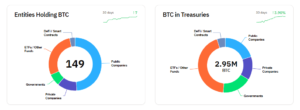Last updated:
 Why Trust Cryptonews
Why Trust Cryptonews
Ad Disclosure
We believe in full transparency with our readers. Some of our content includes affiliate links, and we may earn a commission through these partnerships. Read more

The National Bank of Cambodia (NBC) has permitted commercial banks and payment institutions to offer services involving Category 1 crypto assets, such as backed or stable cryptocurrencies.
This marks the first time the NBC has approved such services, as outlined in a directive issued on December 26 and announced on December 27, according to a report by the Phnom Penh Post.
However, unbacked cryptocurrencies like Bitcoin remain prohibited.
Cambodia Aims to Regulate Digital Currencies
The directive seeks to regulate operations involving digital currencies, reflecting Cambodia’s efforts to align with global financial trends.
Under the new rules, institutions must obtain prior approval from NBC to engage in activities such as exchanging crypto assets for fiat currencies, transferring crypto assets between accounts, and offering custody services.
Notably, these institutions are barred from utilizing customers’ crypto assets for their own purposes.
Historically, Cambodia has maintained a strict stance against cryptocurrencies, citing risks like fraud, money laundering, and illicit activities, which have previously led to a ban on trading and transactions.
Economic researcher Hong Vanak of the Royal Academy of Cambodia told the Phnom Penh Post that the growing global use of cryptocurrencies alongside their decentralized nature complicates regulation, taxation, and tracking.
Vanak argued that cryptocurrencies provide limited benefits to Cambodia’s economy but suggested that banks and institutions offering crypto-related services could generate revenue through user fees.
Cambodia Blocks Access to 16 Crypto Exchanges
Earlier this month, Cambodia blocked access to 16 cryptocurrency exchange websites, including major platforms like Binance, Coinbase, and OKX, as part of its ongoing effort to regulate the digital asset market.
The action followed a directive signed by acting TRC chairman Srun Kimsann, which restricted access to 102 domains, primarily targeting online gambling sites.
Crypto exchange websites were included in the crackdown due to their lack of licensing from the Securities and Exchange Regulator of Cambodia (SERC).
While website access has been restricted, mobile applications for these platforms remain available.
Currently, only two companies have licenses under SERC’s “FinTech Regulatory Sandbox” program.
These entities can trade digital assets but are prohibited from exchanging cryptocurrencies for Cambodia’s legal tender or other fiat currencies.
Despite these measures, Cambodia remains a global leader in retail crypto use per capita, according to analytics firm Chainalysis.
Centralized exchanges account for 70% of crypto transactions in the country.
However, the country faces scrutiny for crypto-related criminal activities.
The UN Office of Drugs and Crime reported that criminal organizations in Cambodia use cryptocurrencies for money laundering and dark-web transactions.
Chainalysis identified over $49 billion in crypto transactions between 2021 and mid-2024 facilitated by Huione Guarantee, a marketplace within the Cambodian conglomerate Huione Group.


















